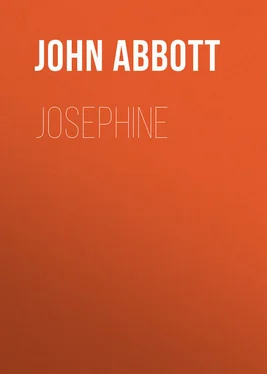John Abbott - Josephine
Здесь есть возможность читать онлайн «John Abbott - Josephine» — ознакомительный отрывок электронной книги совершенно бесплатно, а после прочтения отрывка купить полную версию. В некоторых случаях можно слушать аудио, скачать через торрент в формате fb2 и присутствует краткое содержание. Жанр: foreign_antique, foreign_prose, Историческая проза, на английском языке. Описание произведения, (предисловие) а так же отзывы посетителей доступны на портале библиотеки ЛибКат.
- Название:Josephine
- Автор:
- Жанр:
- Год:неизвестен
- ISBN:нет данных
- Рейтинг книги:4 / 5. Голосов: 1
-
Избранное:Добавить в избранное
- Отзывы:
-
Ваша оценка:
- 80
- 1
- 2
- 3
- 4
- 5
Josephine: краткое содержание, описание и аннотация
Предлагаем к чтению аннотацию, описание, краткое содержание или предисловие (зависит от того, что написал сам автор книги «Josephine»). Если вы не нашли необходимую информацию о книге — напишите в комментариях, мы постараемся отыскать её.
Josephine — читать онлайн ознакомительный отрывок
Ниже представлен текст книги, разбитый по страницам. Система сохранения места последней прочитанной страницы, позволяет с удобством читать онлайн бесплатно книгу «Josephine», без необходимости каждый раз заново искать на чём Вы остановились. Поставьте закладку, и сможете в любой момент перейти на страницу, на которой закончили чтение.
Интервал:
Закладка:
French philosophy had at this time undermined the religion of Jesus Christ. All that is sacred in the domestic relations was withering beneath the blight of infidelity. Beauharnais, a man of fashion and of the world, had imbibed, to the full, the sentiments which disgraced the age. Marriage was deemed a partnership, to be formed or dissolved at pleasure. Fidelity to the nuptial tie was the jest of philosophers and witlings. Josephine had soon the mortification of seeing a proud, beautiful, and artful woman taking her place, and openly and triumphantly claiming the attentions and the affections of her husband. This woman, high in rank, loved to torture her poor victim. "Your dear Alexander," she said to Josephine, "daily lavishes upon others the tribute of attachment which you think he reserves solely for you." She could not bear to see the beautiful and virtuous Josephine happy, as the honored wife of her guilty lover, and she resolved, if possible, to sow the seeds of jealousy so effectually between them as to secure a separation.
In the year 1780 Josephine gave birth to her daughter Hortense. This event seemed for a time to draw back the wandering affections of Beauharnais. He was really proud of his wife. He admired her beauty and her grace. He doted upon his infant daughter. But he was an infidel. He recognized no law of God, commanding purity of heart and life, and he contended that Josephine had no right to complain, as long as he treated her kindly, if he did indulge in the waywardness of passion.
The path of Josephine was now, indeed, shrouded in gloom, and each day seemed to grow darker and darker. Hortense became her idol and her only comfort. Her husband lavished upon her those luxuries which his wealth enabled him to grant. He was kind to her in words and in all the ordinary courtesies of intercourse. But Josephine's heart was well-nigh broken. A few years of conflict passed slowly away, when she gave birth, in the year 1783, to her son Eugene. In the society of her children the unhappy mother found now her only solace.
While the Viscount Beauharnais was ready to defend his own conduct, he was by no means willing that his wife should govern herself by the same principles of fashionable philosophy. The code infidel is got up for the especial benefit of dissolute men ; their wives must be governed by another code. The artful woman, who was the prime agent in these difficulties, affected great sympathy with Josephine in her sorrows, protested her own entire innocence, but assured her that M. Beauharnais was an ingrate, entirely unworthy of her affections. She deceived Josephine, hoarded up the confidence of her stricken heart, and conversed with her about William , the memory of whose faithful love now came with new freshness to the disconsolate wife.
Josephine, lured by her, wrote a letter to her friends in Martinique, in which she imprudently said, "Were it not for my children, I should without a pang, renounce France forever. My duty requires me to forget William; and yet if we had been united together, I should not to-day have been troubling you with my griefs."
The woman who instigated her to write this letter was infamous enough to obtain it by stealth and show it to Beauharnais. His jealousy and indignation were immediately aroused to the highest pitch. He was led by this malicious deceiver to believe that Josephine had obtained secret interviews with William, and the notoriously unfaithful husband was exasperated to the highest degree at the very suspicion of the want of fidelity in his wife. He reproached her in language of the utmost severity, took Eugene from her, and resolved to endeavor, by legal process, to obtain an entire divorce. She implored him, for the sake of her children, not to proclaim their difficulties to the world. He, however, reckless of consequences, made application to the courts for the annulment of the matrimonial bond. Josephine was now compelled to defend her own character. She again retired with Hortense to the convent, and there, through dreary months of solitude, and silence, and dejection, awaited the result of the trial upon which her reputation as a virtuous woman was staked. The decree of the court was triumphantly in her favor, and Josephine returned to her friends to receive their congratulations, but impressed with the conviction that earth had no longer a joy in store for her. Her friends did all in their power to cheer her desponding spirit; but the wound she had received was too deep to be speedily healed. One day her friends, to divert her mind from brooding over irreparable sorrows, took her, almost by violence, to Versailles. They passed over the enchanting grounds, and through the gorgeously-furnished apartments of the Great and Little Trianon, the favorite haunts of Maria Antoinette. Here the beautiful Queen of France was accustomed to lay aside the pageantry of royalty, and to enjoy, without restraint, the society of those who were dear to her. Days of darkness and trouble had already begun to darken around her path. As Josephine was looking at some of the works of art, she was greatly surprised at the entrance of the queen, surrounded by several ladies of her court. Maria Antoinette immediately recognized Josephine, and with that air of affability and kindness which ever characterized her conduct, she approached her, and, with one of her winning smiles, said, "Madame Beauharnais, I am very happy to see you at the two Trianons. You well know how to appreciate their beauties. I should be much pleased to learn what objects you consider most interesting. I shall always receive you with pleasure."
These words from the queen were an unspeakable solace to Josephine. Her afflicted heart needed the consolation. The queen was acquainted with her trials, and thus nobly assured her of her sympathy and her confidence. In a few days Maria Antoinette invited Josephine to a private interview. She addressed her in words of the utmost kindness, promised to watch over the interests of her son, and at the same time, as a mark of her especial regard, she took from her neck an antique ornament of precious stones, and passed it over the neck of Josephine. The king also himself came in at the interview, for his heart had been softened by sorrow, and addressed words of consolation to the injured and discarded wife.
Josephine now received letters from Martinique earnestly entreating her to return, with her children, to the home of her childhood. World-weary, she immediately resolved to accept the invitation. But the thought of crossing the wide ocean, and leaving her son Eugene behind, was a severe pang to a mother's heart. Eugene had been taken from her and sent to a boarding-school. Josephine felt so deeply the pang of separation from her beloved child, that she obtained an interview with M. Beauharnais, and implored him to allow her to take Eugene with her. He gave a cold and positive refusal.
A few days after this, Josephine, cruelly separated from her husband and bereaved of her son, embarked with Hortense for Martinique. She strove to maintain that aspect of cheerfulness and of dignity which an injured but innocent woman is entitled to exhibit. When dark hours of despondency overshadowed her, she tried to console herself with the beautiful thought of Plautus: "If we support adversity with courage, we shall have a keener relish for returning prosperity." It does not appear that she had any refuge in the consolations of religion. She had a vague and general idea of the goodness of a superintending Providence, but she was apparently a stranger to those warm and glowing revelations of Christianity which introduce us to a sympathizing Savior, a guiding and consoling Spirit, a loving and forgiving Father. Could she then, by faith, have reposed her aching head upon the bosom of her heavenly Father, she might have found a solace such as nothing else could confer. But at this time nearly every mind in France was more or less darkened by the glooms of infidelity.
Читать дальшеИнтервал:
Закладка:
Похожие книги на «Josephine»
Представляем Вашему вниманию похожие книги на «Josephine» списком для выбора. Мы отобрали схожую по названию и смыслу литературу в надежде предоставить читателям больше вариантов отыскать новые, интересные, ещё непрочитанные произведения.
Обсуждение, отзывы о книге «Josephine» и просто собственные мнения читателей. Оставьте ваши комментарии, напишите, что Вы думаете о произведении, его смысле или главных героях. Укажите что конкретно понравилось, а что нет, и почему Вы так считаете.












